'FREE PALESTINE' IS NOT ANTISEMITIC
Pro-Palestinian encampments and
protests spread on college campuses across the U.S.
APRIL 23, 2024
By Rachel TreismanNPR

Students from MIT, Harvard University and others rally at a protest encampment at MIT's Kresge Lawn in Cambridge, Massachusetts on Monday.Scott Eisen/Getty Images
Tensions are growing on U.S. college campuses, as the pro-Palestinian demonstrations that have rocked New York-area schools in recent days — and the ensuing arrests of participants — spread from coast to coast.
Students have launched protests and encampments at more than a dozen schools across the country, from Massachusetts to Michigan to California. They are calling for an end both to the Israel-Hamas war and their universities' investment in companies that profit from it or, more broadly, do business with Israel.
It's the latest wave of protests to sweep college campuses since the Oct. 7 attack Hamas-led attack on Israel, in which 1,200 people were killed and roughly 240 others taken hostage, according to Israeli authorities, who say more than 130 remain captive in Gaza. Israel's ensuing military response in Gaza has killed more than 34,000 Palestinians, some two-thirds of them women and children, according to the Gaza Ministry of Health.

EDUCATION
Columbia University shifts classes to remote-only after a wave of protests on campus
College-age Americans are more likely to sympathize with Palestinians than Israelis, according to recent polling by the Pew Research Center.
And the Israel-Hamas war has become a major flashpoint at institutions of higher education, many of which are now grappling with how to balance free speech protections with student safety at a moment of rising antisemitism and Islamophobia.
When asked about the protests on Monday — the first night of the Jewish holiday of Passover — President Biden said he condemned "the antisemitic protests" as well as "those who don't understand what's going on with the Palestinians."
Here's where things stand with the demonstrations:
Law enforcement break up protests from New York to California

NYPD officers face pro-Palestinian protesters on Monday night after clearing an encampment on NYU's campus.Alex Kent/AFP via Getty Images
On Monday morning, police arrested nearly 50 protesters at Yale University while Columbia University, which has seen rising tensions since over 100 demonstrators were arrested last week, shifted classes online — a move it has since extended through the end of the semester. (Classes end on April 29 and finals end on May 10, according to the school's academic calendar.)
Later Monday night, New York police cleared an encampment of pro-Palestinian protesters outside New York University's Gould Plaza, taking an unspecified number of them into custody after they refused to leave.

RELIGION
Concerns over antisemitism rise as Jews begin observing Passover
An NYU faculty group tweeted that the school had authorized police to "arrest its own students, faculty, staff and anyone who dares to stand in solidarity with Palestine."
NYU spokesperson John Beckman said in a statement that after some 50 demonstrators assembled that morning, the university closed the plaza to prevent additional people from joining.
He said more protesters — "many of whom we believe were not affiliated with NYU" — breached the barriers in the afternoon, changing the dynamic with their "disorderly, disruptive, and antagonizing behavior," and noted reports of "intimidating chants and several antisemitic incidents.
"Given the foregoing and the safety issues raised by the breach, we asked for assistance from the NYPD," he added. "The police urged those on the plaza to leave peacefully, but ultimately made a number of arrests.
Meanwhile, across the country at California State Polytechnic University, a group of students waving Palestinian flags and signs occupied Siemens Hall, an academic and administrative building on the Humboldt campus.
They barricaded the front entrance with chairs, desks, trash cans and other pieces of furniture, according to reports from ABC affiliate KRCR and an image posted to social media by the organization National Students for Justice in Palestine.
Around 8:30 p.m. local time, school officials urged people to stay away from the building, calling it "a dangerous and volatile situation." They said they were concerned about the safety of the protesters barricaded inside and called on them to heed law enforcement's directive to leave peacefully.
Several hours later, they said campus will remain closed through Wednesday for the safety of the community.
"Buildings are locked down and key cards will not work," they said, adding that "In-person classes and activities are transitioning to remote where possible."
Solidarity encampments emerge at over a dozen schools

Pro-Palestinian students protest at a tent encampment in front of Sproul Hall on the UC Berkeley campus on Monday.Justin Sullivan/Getty Images
Pro-Palestinian students at colleges in multiple states are now launching movements of their own, many as a direct response to the recent events at Columbia.
Students at Northwestern University, Ohio State University, the University of North Carolina at Chapel Hill, Temple University, Princeton University, the University of Nevada, Las Vegas and others held walkouts and rallies in support of Columbia students last week after their arrest.
And others have followed suit this week.
A Pro-Palestinian student group at the University of Minnesota tweeted that they were joining with Columbia students by setting up an encampment on their own campus lawn at 4 a.m. on Tuesday, in solidarity "with the people of Palestine and with students standing up for Palestine across the country."
Students at the University of Pittsburgh also set up tents on Tuesday morning outside its central Cathedral of Learning, which they said in a news release was done in solidarity with students at a list of other schools.

NATIONAL
Pro-Palestinian demonstrators shut down airport highways and bridges in major cities
Some 300 students staged a "solidarity walkout" at Stanford University on Monday to show support for Palestinians in Gaza and their pro-Palestinian peers at other colleges, according to the Stanford Daily.
Students have also put up encampments at several Boston-area schools, including the Massachusetts Institute of Technology, Emerson College and Tufts University. Harvard University has closed Harvard Yard to the public through Friday, in apparent anticipation of potential protests.
At the University of Michigan, student groups erected some two dozen tents in the middle of campus on Monday. Michigan Public reports that some 100 people gathered for a rally that afternoon, chanting "Disclose! Divest! We will not stop, we will not rest!" as police looked on.
Students at the University of California, Berkeley also set up a "Gaza Solidarity Encampment" on Monday. Organizers told ABC7 that they want school leaders to end what they're calling their "silence" over the situation in Gaza and to provide better protection for Palestinian, Arab and Muslim students.
Questions loom about protections for students and speech

Protestors occupy an encampment on the grounds of Columbia University in New York City on Monday.David Dee Delgado/Getty Images
The recent turmoil has raised even more questions about the responsibility of universities when it comes to balancing student safety with freedom of expression.
Some pro-Palestinian activists have publicly said they are protesting Israel, not Jews, and noted that their ranks include many Jewish students. At Columbia and Yale, some came together for Passover seders mid-protest.
Debbie Becher, a sociology professor at Barnard College (which is part of Columbia), told Morning Edition Tuesday that campus feels relatively safe and peaceful, unlike the portrayals of it on social media. She described the pro-Palestinian encampment as a "place of sharing and community building."
"Students have watched movies there, they hold teach-ins, they study, they eat together," she said.
But the demonstrations have left other Jewish students feeling unsafe, particularly due to reports of antisemitic rhetoric and harassment on several campuses.
The Anti-Defamation League has tracked several instances of protesters expressing support for Hamas and the Oct. 7 attack. A protester at Columbia, for example, held up a sign reading "Al-Qasam's next targets" with an arrow pointing towards nearby pro-Israel counter-protesters (referring to Al-Qassam Brigades, the military wing of Hamas).

MIDDLE EAST CRISIS — EXPLAINED
The war in Gaza is a big story on campus. These student reporters aren't shying away
It says students at various schools have also waved signs glorifying figures associated with U.S.-designated terror groups, used pro-Intifada slogans and called for destroying Zionism and either hounding or getting rid of Zionists altogether.
Tensions reached such a boiling point at Columbia that a university-affiliated rabbi urged Jewish students over the weekend to return home for their own safety.
New York City Mayor Eric Adams spoke out against antisemitic incidents and hate speech at Columbia in a statement that referenced specific incidents, including a woman yelling "We are Hamas" and student groups chanting "We don't want no Zionists here."
The White House also released a statement on Sunday condemning the "calls for violence and physical intimidation targeting Jewish students," saying they have "have absolutely no place on any college campus, or anywhere in the United States of America."

NYPD officers detain a person as pro-Palestinian protesters gather outside of Columbia University on Thursday.Kena Bentacur/AFP via Getty Images
Meanwhile, Columbia University President Minouche Shafik is facing criticism for her response to the protests.
Rep. Elise Stefanik, R-N.Y., is leading New York Republicans' charge to get her to resign, a seeming repeat of the situation in December, when the presidents of Harvard and the University of Pennsylvania resigned after widely-panned Congressional testimony.
Shafik testified before Congress about the school's response to antisemitism last Wednesday, the day students set up the encampment. In her testimony, Shafik told lawmakers that antisemitism "is not tolerated and it is not acceptable."
Sponsor Message
The next day, she called in the NYPD to break up the demonstration, which she said violated university policies and posed a "clear and present danger" to its functioning.

MIDDLE EAST CRISIS — EXPLAINED
Lawmakers grill the presidents of Harvard, MIT and Penn over antisemitism on campus
Her decision has been widely criticized by groups including the university's own Knight First Amendment Institute and the American Association of University Professors. Its Columbia and Barnard chapter plans to submit a "resolution of censure" against her and other administration officials, the Columbia Spectator reported Tuesday.
"President Shafik's violation of the fundamental requirements of academic freedom and shared governance, and her unprecedented assault on students' rights, warrants unequivocal and emphatic condemnation," it reads.
In a Monday note to the Columbia community, Shafik said administrators, deans and faculty were working to resolve the situation, including by discussing with protesters what actions the community can take to "peacefully complete the term and return to respectful engagement with each other."
She added that she is aware of the debate around "whether or not we should use the police on campus" and happy to participate in those discussions.
"But I do know that better adherence to our rules and effective enforcement mechanisms would obviate the need for relying on anyone else to keep our community safe," she said. "We should be able to do this ourselves."
Becher, the Barnard professor, said "the actual crisis here is the university leadership's failure to stand up to right-wing actors."
"Our president has, over the past six months and at Congress last week, abandoned our institutions of academic freedom, freedom of expression and turned our campus into a police state," she added. "And now other campuses around the country are following suit."
In a Monday statement, the civil liberties group Foundation for Individual Rights and Expression (FIRE) called on universities to protect peaceful protest but "ensure the swift arrest" of anyone engaging in violence on campus. But it acknowledged the extra challenges posed by this "extraordinarily difficult" moment.
"Tensions are high and nerves are raw," it said. "The charity and grace necessary for productive dialogue are in vanishingly short supply, and it can be difficult to separate protected expression from its opposite. Amidst this intense pressure, our nation's institutions of higher education must lead the way."
Protests roiling US colleges escalate with arrests, new encampments and closures
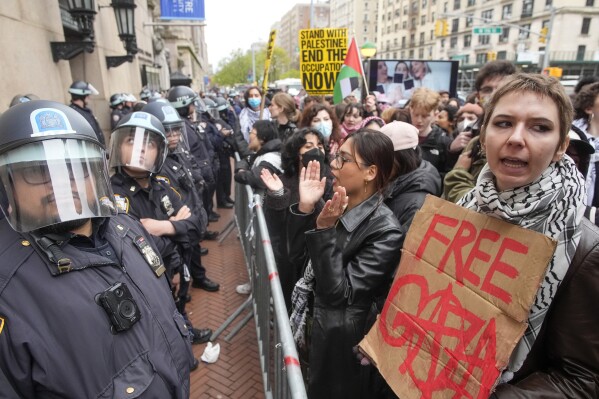
Police in Riot gear stand guard as demonstrators chant slogans outside the Columbia University campus, Thursday, April 18, 2024, in New York. U.S. colleges and universities are preparing for end-of-year commencement ceremonies with a unique challenge: providing safety for graduates while honoring the free speech rights of students involved in protests over the Israel-Hamas war.
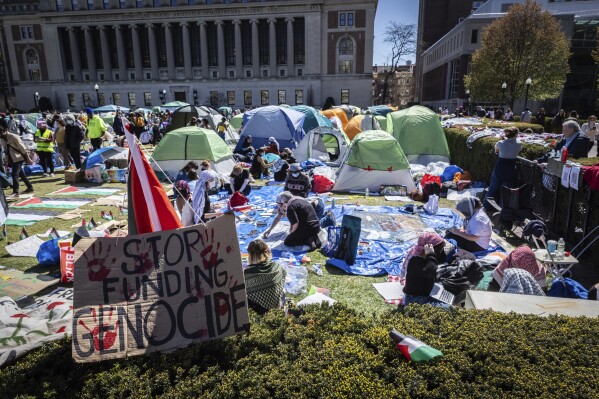
A sign sits erected at the pro-Palestinian demonstration encampment at Columbia University in New York, Monday, April 22, 2024. U.S. colleges and universities are preparing for end-of-year commencement ceremonies with a unique challenge: providing safety for graduates while honoring the free speech rights of students involved in protests over the Israel-Hamas war.
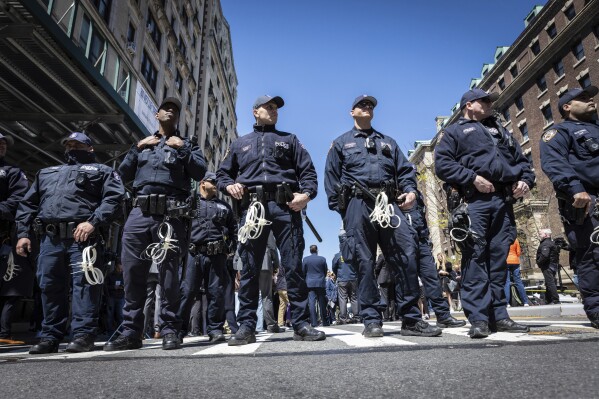
NYPD officers from the Strategic Response Group form a wall of protection around Deputy Commissioner of Legal Matters Michael Gerber and Deputy Commissioner of Operations Kay Daughtry, not in the picture, during a press conference regarding the ongoing pro-Palestinians protest encampment at Columbia University in New York on Monday, April 22, 2024. U.S. colleges and universities are preparing for end-of-year commencement ceremonies with a unique challenge: providing safety for graduates while honoring the free speech rights of students involved in protests over the Israel-Hamas war. (AP Photo/Stefan Jeremiah)
BY KAREN MATTHEWS AND NICK PERRY
April 23, 2024
NEW YORK (AP) — The student protests of Israel’s war with Hamas that have been creating friction at U.S. universities escalated Tuesday as new encampments sprouted and some colleges encouraged students to stay home and learn online, after dozens of arrests across the country.
The protests had been bubbling for months but kicked into a higher gear after more than 100 pro-Palestinian demonstrators who had camped out on Columbia University’s upper Manhattan campus were arrested last week.
With tensions at Columbia continuing to run high and some students afraid to set foot on the campus, officials said the university will switch to hybrid learning for the rest of the semester.
Protests have been spreading elsewhere in New York and nationwide. Many universities have about two weeks of classes left before the semester ends and have been grappling with how to handle protests.
Police said 133 protesters were taken into custody late Monday after a protest at New York University and all had been released with summonses to appear in court on disorderly conduct charges.
University spokesperson John Beckman said NYU was carrying on with classes Tuesday.
READ MORE
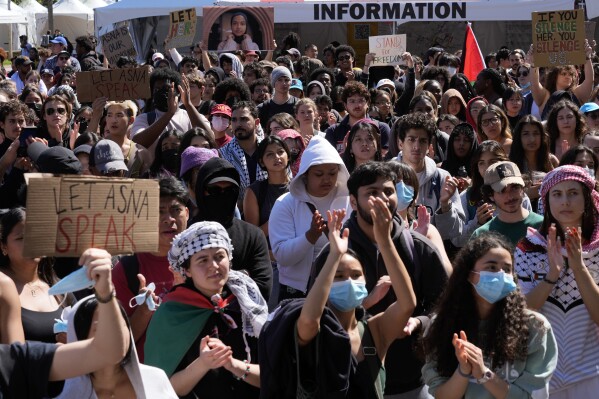
With graduation near, colleges seek to balance safety and students’ right to protest Gaza war
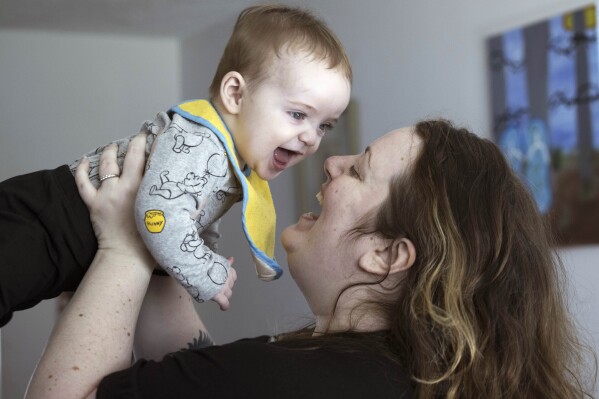
America’s child care crisis is holding back moms without college degrees
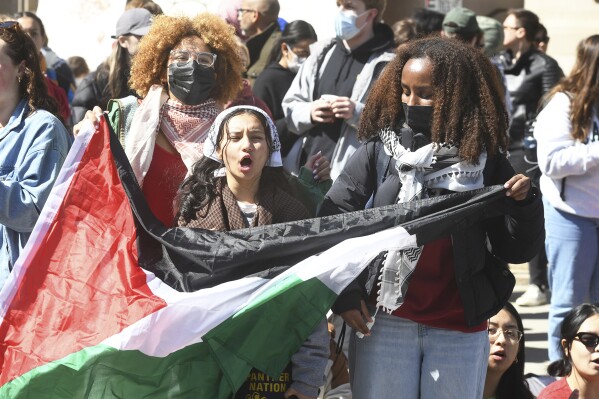
Pro-Palestinian protests sweep US college campuses following mass arrests at Columbia
California State Polytechnic University, Humboldt, announced that its campus will be closed through Wednesday after demonstrators occupied a building Monday night. Classes were to be conducted remotely, the school said on its website.
At the University of Michigan, protesters had set up more than 30 tents on the central part of the Ann Arbor campus called the Diag.
In Connecticut, police on Monday arrested 60 protesters at Yale University, including 47 Yale students, after they refused to leave an encampment on Beinecke Plaza.
Yale President Peter Salovey said protesters had declined an offer to end the demonstration and meet with trustees, and after several warnings, school officials determined “the situation was no longer safe” and police cleared the encampment and made arrests.
At the University of Minnesota, nine anti-war protesters were arrested Tuesday morning after police took down an encampment a couple of hours after it was set up in front of the library.
Since the war began, colleges and universities have struggled to balance safety with free speech rights. Many long tolerated protests but are now doling out more heavy-handed discipline.
The protests have pitted students against one another, with pro-Palestinian students demanding that their schools condemn Israel’s assault on Gaza and divest from companies that sell weapons to Israel. Some Jewish students, meanwhile, say much of the criticism of Israel has veered into antisemitism.
As Donald Trump walked into a Manhattan courtroom Tuesday morning to attend his historic hush money trial, he spoke briefly to reporters and focused on the turmoil at college campuses, blaming President Joe Biden.
“What’s going on is a disgrace to our country and it’s all Biden’s fault,” Trump said.
A day earlier, when asked whether he condemned “the antisemitic protests,” Biden said he did.
“I also condemn those who don’t understand what’s going on with the Palestinians,” Biden said after an Earth Day event outside Washington.
Columbia University President Minouche Shafik said in a message to the school community Monday that she was “deeply saddened” by what was happening on the campus.
Robert Kraft, who owns the New England Patriots football team and funded the Kraft Center for Jewish Student Life across from Columbia’s campus, said he was suspending donations to the university.
“I am no longer confident that Columbia can protect its students and staff and I am not comfortable supporting the university until corrective action is taken,” he said in a statement.
Columbia University has a history of protest, most notably in 1968, when hundreds of students angry about racism and the Vietnam War occupied five campus buildings. After a week, a thousand police officers swept in and cleared them out, making 700 arrests. The Associated Press reported at the time that 100 students and 15 police officers were injured.
Campus protests began after Hamas’ deadly attack on southern Israel, when militants killed about 1,200 people, most of them civilians, and took roughly 250 hostages. During the ensuing war, Israel has killed more than 34,000 Palestinians in the Gaza Strip, according to the local health ministry, which doesn’t distinguish between combatants and noncombatants but says at least two-thirds of the dead are children and women.
___
Perry reported from Meredith, New Hampshire. Associated Press writers Will Weissert in Triangle, Virginia; Larry Lage in Ann Arbor, Michigan; and John Antczak in Los Angeles contributed to this report.
Pro-Palestinian protesters arrested at Yale, NYU; Columbia cancels in-person classesApril 23, 2024
NEW YORK, April 22 (Reuters) - Police arrested dozens of people at pro-Palestinian demonstrations at Yale University in Connecticut and New York University in Manhattan on Monday, as the war in Gaza continued to reverberate through U.S. university campuses.
The police crackdowns came after Columbia University canceled in-person classes on Monday in response to protesters setting up tent encampments at its New York City campus last week.
Demonstrators blocked traffic around Yale's campus in New Haven, Connecticut, demanding the school divest from military weapons manufacturers. Police arrested more than 45 protesters, according to the student-run Yale Daily News.
In New York, officers moved on the NYU crowd shortly after nightfall as hundreds of demonstrators for hours had defied university warnings that they faced consequences if they failed to vacate a plaza where they had gathered. Video on social media showed police taking down tents in the protesters' encampment.
As demonstrators tussled with officers and chanted, "We will not stop, we will not rest. Disclose. Divest."
A New York police spokesperson said arrests were made after the university asked police to enforce trespassing violations but the total number of arrests and citations would remain unknown until much later. No immediate injuries were reported.
Protests at Yale, Columbia, NYU and other university campuses across the nation began in response to the escalation of the Israeli-Palestinian conflict, following the deadly cross-border raid by Hamas militants on Oct. 7 and Israel's fierce response in the Gaza enclave controlled by Hamas.
In an email to Columbia staff and students on Monday, Columbia President Nemat Minouche Shafik said the university was canceling in-person classes and moving to online teaching to "deescalate the rancor and give us all a chance to consider next steps."
Last week, Shafik called in New York Police to clear a tent encampment protesters had set up on Columbia's main lawn to demand the school divest from Israel-related investments, an unusual move condemned by some faculty.
The school said the encampment violated rules. Police arrested more than 100 students from Columbia on Thursday on charges of trespassing. Columbia and the affiliated Barnard College have suspended dozens of students involved in the protests.
"These tensions have been exploited and amplified by individuals who are not affiliated with Columbia who have come to campus to pursue their own agendas," said Shafik, who last week testified before a U.S. House of Representatives committee, defending the school's response to alleged antisemitism by protesters.
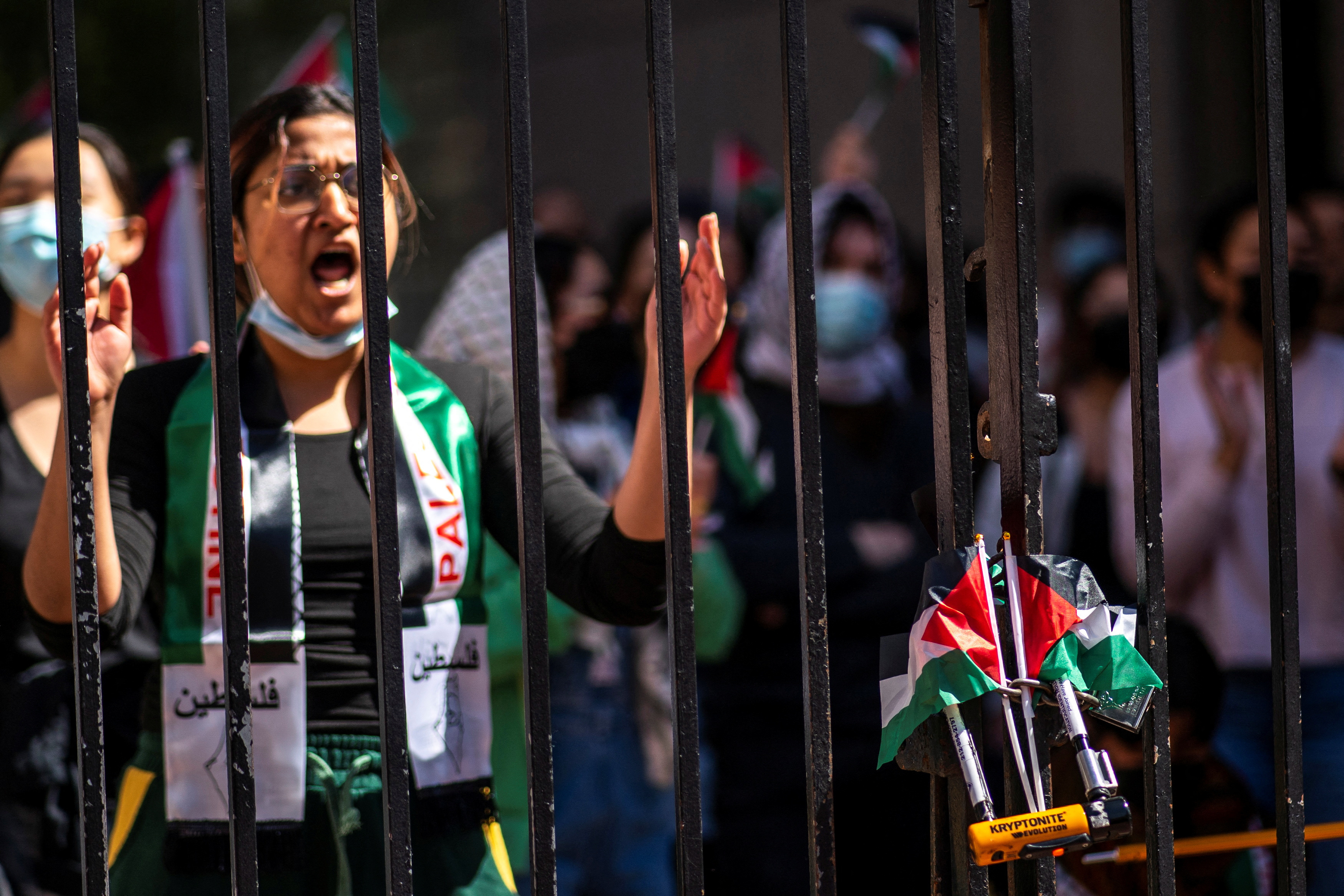
Palestinian flags are placed on a locked fence while students demonstrate outside Columbia University campus, as protests continue inside and outside the university during the ongoing conflict between Israel and the Palestinian Islamist group Hamas, in New York City, U.S., April 22, 2024. REUTERS/Eduardo Munoz
Republicans in the House and the Senate, as well as at least one Democratic senator, demanded Shafik resign.
DONOR THREATENS CUTOFF
Major university donor Robert Kraft was also unsatisfied that Columbia was protecting Jewish students. Kraft, who is Jewish and the owner of the New England Patriots, has donated millions of dollars to Columbia and threatened to cut off further funding, saying in a statement, "I am not comfortable supporting the university until corrective action is taken."
Amid angry confrontations at Columbia between pro-Palestinian and pro-Israel groups, police have received reports of Israeli students having flags snatched from their hands, but no reports "of any physical harm against any student," Tarik Shappard, the chief police spokesperson, told a press conference.
Student protesters spent several nights sleeping in the open on the lawn, and have since set up tents again. Students have organized both Muslim and Jewish prayers at the encampment, and some have given speeches condemning Israel and Zionism and praising Palestinian armed resistance.
More than 100 Columbia faculty joined students on Monday in solidarity at the encampment, where an outdoor seder was planned to mark the first day of the Jewish Passover holiday.
U.S. President Joe Biden, who has been criticized by the protesters for supplying funding and weapons to Israel, said in a statement on Sunday that his administration has put the full force of the federal government behind protecting the Jewish community.
"Even in recent days, we've seen harassment and calls for violence against Jews," Biden said. "This blatant antisemitism is reprehensible and dangerous – and it has absolutely no place on college campuses, or anywhere in our country."
Student organizers from the Columbia encampment criticized the Biden statement, noting that some of the organizers are Jewish and that news outlets had focused on "inflammatory individuals who do not represent us."
"We firmly reject any form of hate or bigotry and stand vigilant against non-students attempting to disrupt the solidarity being forged among students – Palestinian, Muslim, Arab, Jewish, Black and pro-Palestinian classmates and colleagues," they said in a statement.
"It's very clear to us that people on the outside do not understand what this encampment is about," said Lea Salim, a Barnard sophomore who said she was one of 15 Jewish students arrested on the Columbia lawn last week. Salim said it was not antisemitic to criticize the state of Israel.
Reporting by Caitlin Ochs and Jonathan Allen in New York; Additional reporting by Brendan O'Brien in Chicago, Kanishka Singh in Washington and Daniel Trotta in Carlsbad, California; Editing by Chizu Nomiyama, Bill Berkrot Editing by Michael Perry

















